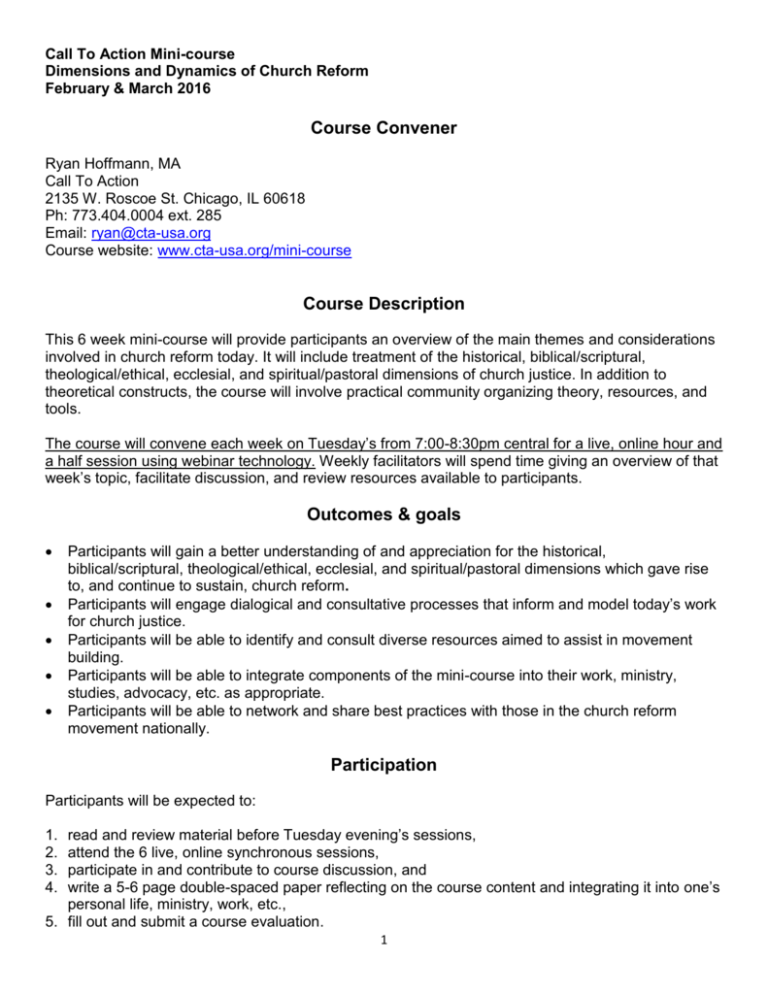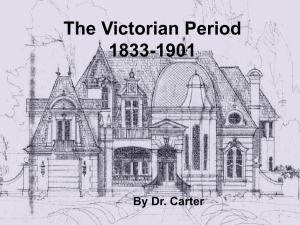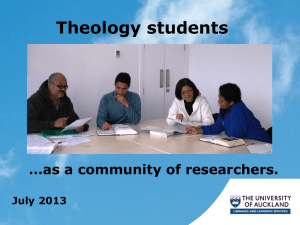Click here to the course syllabus
advertisement

Call To Action Mini-course Dimensions and Dynamics of Church Reform February & March 2016 Course Convener Ryan Hoffmann, MA Call To Action 2135 W. Roscoe St. Chicago, IL 60618 Ph: 773.404.0004 ext. 285 Email: ryan@cta-usa.org Course website: www.cta-usa.org/mini-course Course Description This 6 week mini-course will provide participants an overview of the main themes and considerations involved in church reform today. It will include treatment of the historical, biblical/scriptural, theological/ethical, ecclesial, and spiritual/pastoral dimensions of church justice. In addition to theoretical constructs, the course will involve practical community organizing theory, resources, and tools. The course will convene each week on Tuesday’s from 7:00-8:30pm central for a live, online hour and a half session using webinar technology. Weekly facilitators will spend time giving an overview of that week’s topic, facilitate discussion, and review resources available to participants. Outcomes & goals Participants will gain a better understanding of and appreciation for the historical, biblical/scriptural, theological/ethical, ecclesial, and spiritual/pastoral dimensions which gave rise to, and continue to sustain, church reform. Participants will engage dialogical and consultative processes that inform and model today’s work for church justice. Participants will be able to identify and consult diverse resources aimed to assist in movement building. Participants will be able to integrate components of the mini-course into their work, ministry, studies, advocacy, etc. as appropriate. Participants will be able to network and share best practices with those in the church reform movement nationally. Participation Participants will be expected to: read and review material before Tuesday evening’s sessions, attend the 6 live, online synchronous sessions, participate in and contribute to course discussion, and write a 5-6 page double-spaced paper reflecting on the course content and integrating it into one’s personal life, ministry, work, etc., 5. fill out and submit a course evaluation. 1. 2. 3. 4. 1 Dates, topics, & facilitators Week 1: February 9, 2016 Week 2: February 16 Week 3: February 23 Week 4: March 1 Week 5: March 8 Week 6: March 15 Week 7: March 22, 2016 Welcome & overview Ryan Hoffmann Reform Throughout the Ages Aaron Bianco, STD Jesus the Reformer Emily Dykman, DMin To Reform or Not To Reform: MT Davila, PhD Ethics & Theology BREAK Called to be Church: Robert Ludwig, PhD Called to Reform Spirituality of Reform Kimberly Lymore, DMin Organizing for Justice Melissa Browning, PhD Wrap-up & evaluation Ryan Hoffmann Course Notes The course is $10/session (week) or $50 for the series of 6 sessions. In addition, we ask a commitment to the material and openness to the learning process. Readings for each week will be assigned. Participants will be expected to read material before that week’s Tuesday evening session. Each week the presenter will make available to participants an outline of their presentation notes and at least 3-5 resources that can be used to supplement that week’s topic (e.g., for further reading). While the course is not credit bearing, we will issue a certificate of completion for those interested in taking this for continuing education and/or professional/personal development. No grades will be given. This is primarily for enrichment, renewal, and professional and personal development. Facilitator Biographies Aaron Bianco, STD studied in Rome, earning a Doctorate of Sacred Theology (S.T.D.) with an emphasis in Early Church Mothers and Fathers at the Pontifical University of Saint Thomas (the Angelicum). Aaron routinely leads study trips to Rome and is fluent in Italian. He is currently Call To Action’s Program Associate where he works with the 20/30 young adult community, national chapters, and the Church Worker justice program. Emily Dykman, DMin completed a B.M. in Piano Performance from Viterbo University, a master’s degree in pastoral ministry from St. Mary’s University, and completed a doctor of ministry degree in congregational mission and leadership from Luther Seminary in May 2014. Her thesis focused on an influence of scripture in assisting the laity in their recognition of vocation and participation in God’s mission. In particular, she studied the influence of an action research intervention using dwelling in the word in shifting the parish council’s ability to work collaboratively with the parish priest rather than relying upon the priest for sole directives. She teaches courses in liturgy and worship, ritual, sacraments, scripture, and servant leadership. 2 MT Dávila, PhD is associate professor of Christian ethics at Andover Newton Theological School. Her current focus is on the intersection of Christian discipleship and activism, specifically as it relates to the practice of the option for the poor in the United States. She has written on immigration and race, the ethics of the use of force, the use of the social sciences in ethical reflection, and ethics in the public square. She lives in Malden, MA, with her husband and 4 children, where they attend St. Joseph’s Parish. Robert Ludwig, PhD is an experienced educator and scholar. He earned his MA and PhD in theology from The Aquinas Institute of Theology (now at St. Louis University), and studied political theology in Germany at Tubingen. His dissertation on theology and politics in America focused on Jesuit peace activist Daniel Berrigan and the Catholic Peace Movement during the Vietnam War. His award-winning book, “Reconstructing Catholicism for a New Generation” (Crossroad, 1995) includes a penetrating exploration of the challenges facing humanity due to environmental degradation and the insights of Thomas Berry and Teilhard de Chardin for reconstructing Christian spirituality for a sustainable future. At Holy Names University, Dr. Ludwig oversees the revision of the programs in Culture and Spirituality and the development of adult learning modalities to make the program more accessible to adult learners. Kimberly Lymore, DMin is the Associate Minister at the Faith Community of St. Sabina in Chicago, IL, which is known for its dynamic worship and social activism, under the leadership of Rev. Michael L. Pfleger. Kimberly has facilitated many workshops, classes and retreats in her 15-year ministerial career including classes on Social Justice at Xavier University, in New Orleans, LA. Most recently she became an adjunct instructor teaching Social Justice at Calumet College of St. Joseph, in Whiting, IN. In 2003, Kimberly received her Master in Divinity with a concentration in Word and Worship from Catholic Theological Union. In May of 2009 she received her Doctor of Ministry from McCormick Theological Union. Kimberly also has an article in the publication, Emerging from the Vineyard: Essays by Lay Ecclesial Ministers. Melissa Browning, PhD received her Ph.D. in Christian Ethics from Loyola University Chicago (2011). She also holds an M.Div. in Global Missions from George W. Truett Theological Seminary at Baylor University (2002) and a B.A. in Religious Studies from Gardner-Webb University (1999). Dr. Browning’s primary research focuses on community-based moral reasoning. Her first book looked at the intersection of public theology and public health through research with women living with HIV and AIDS in Mwanza, Tanzania. Dr. Browning is an ordained Baptist minister with the Cooperative Baptist Fellowship and has experience working with faith-based non-profits, particularly in international development, community development, and community organizing. 3






